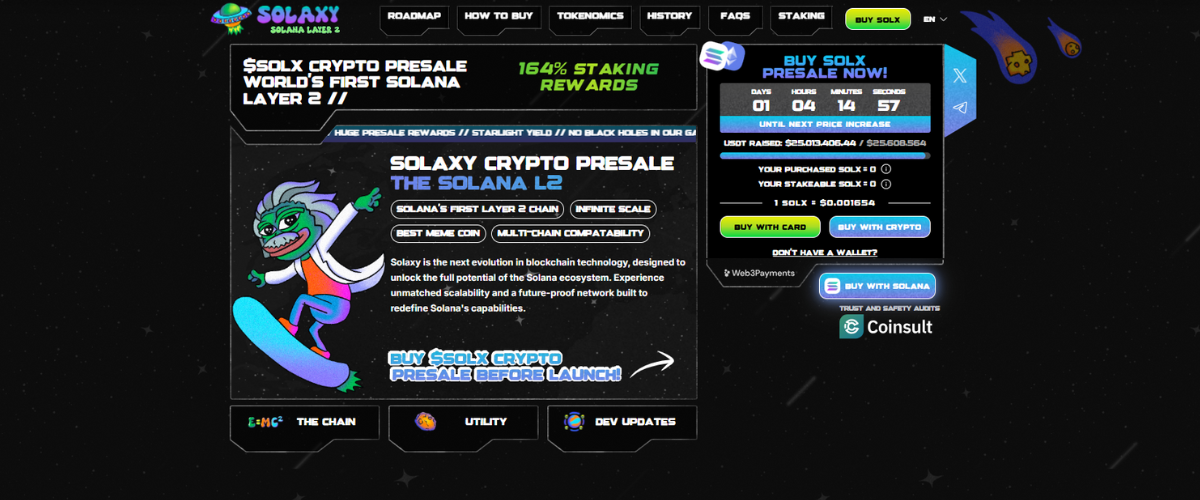Hamster Kombat’s L2 Network Surpasses Solana in TPS
05.03.2025 13:35 2 min. read Alexander Zdravkov
Hamster Kombat's new Layer-2 (L2) blockchain, Hamster Network, has surpassed Solana in transactions per second (TPS).
Just two weeks after its launch, Hamster Network reached 34,028 TPS, nearly eight times faster than Solana’s 4,360 TPS, according to Solscan. This impressive speed puts Hamster Network ahead of Solana in raw performance, signaling potential to challenge Solana’s dominance in high-speed blockchain applications.
Hamster Network aims to address scalability challenges like high gas fees and network congestion, providing a low-cost, high-speed environment for decentralized applications (dApps). The network is also preparing to launch an accelerator program to support developers building on its platform.
Despite these achievements, the price of the Hamster Kombat token (HMSTR) has dropped by 0.5%, trading at $0.00208.
The launch of Hamster Network has generated optimism within the community, driving token demand as speculation about further growth rises. The network is also involving users in stress-testing through its “Hamster Boost” initiative, rewarding participants for helping ensure the platform’s stability before broader use.
If Hamster Network continues to maintain its speed and developer momentum, it could emerge as a serious contender in the Layer-2 space.
A New Solana L2 Solution Makes Waves
Solaxy ($SOLX) is revolutionizing blockchain technology by offering the first Layer-2 solution on Solana. This project significantly improves speed and reduces transaction fees, solving network congestion problems.
Solaxy’s advanced rollup architecture shows strong potential to optimize transaction speeds and reduce congestion-related inefficiencies on Solana. The project’s approach reduces congestion and ensures smooth execution, even during peak activity. For traders, this means faster and more reliable transactions, preventing failed swaps.
Beyond improving transaction efficiency, Solaxy is expanding interoperability between Solana and Ethereum. The $SOLX token functions as a multi-chain asset, allowing users to engage across both ecosystems. This provides access to Ethereum’s liquidity while benefiting from Solana’s speed and cost efficiency.
-
1
JPMorgan Lays Groundwork for Tokenized Finance with New Blockchain Trademark
17.06.2025 12:00 1 min. read -
2
Malaysia Opens the Door to Blockchain Experimentation With Launch of Innovation Hub
18.06.2025 22:00 2 min. read -
3
The Bitcoin-Cardano Bridge is Here: What it Means for DeFi
10.06.2025 21:00 1 min. read -
4
Chainlink Edges Closer to Wall Street Integration, Says Co-Founder
12.06.2025 9:00 1 min. read -
5
Polygon Breaks from Decentralization as Sandeep Nailwal Assumes Full Control
11.06.2025 20:00 2 min. read
Cardano Leads Developer Activity, Ethereum Maintains Ecosystem Dominance
Development trends across major blockchain networks show Cardano pulling ahead in core contributions, while Ethereum continues to dominate the broader ecosystem despite a drop in participation.
Kraken’s Ink Chain Ramps Up Usage as Token Launch Approaches
Ink, the Layer-2 network incubated by Kraken and built on Optimism’s Superchain framework, is suddenly buzzing with on-chain activity.
Solana Partners with Kazakhstan to Launch Digital Economy Zone
Solana is making its next major move—this time, not through memecoins, but national partnerships.
Hyperliquid Chosen as Core Reserve in Lion Group’s Blockchain Expansion
Lion Group Holding Ltd. has raised $600 million from investment firm ATW Partners to fuel a major shift into decentralized finance.
-
1
JPMorgan Lays Groundwork for Tokenized Finance with New Blockchain Trademark
17.06.2025 12:00 1 min. read -
2
Malaysia Opens the Door to Blockchain Experimentation With Launch of Innovation Hub
18.06.2025 22:00 2 min. read -
3
The Bitcoin-Cardano Bridge is Here: What it Means for DeFi
10.06.2025 21:00 1 min. read -
4
Chainlink Edges Closer to Wall Street Integration, Says Co-Founder
12.06.2025 9:00 1 min. read -
5
Polygon Breaks from Decentralization as Sandeep Nailwal Assumes Full Control
11.06.2025 20:00 2 min. read



